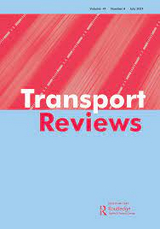External publications

Why do paratransit operators resist participation in bus rapid transit? Case evidence from Bogota, Mexico City, Johannesburg and Lagos
Asimeng, Theodore / Dirk HeinrichsExternal Publications (2020)
in: Transport Reviews 41 (1), p. 115-135
DOI: https://doi.org/10.1080/01441647.2020.1818872
Public transport in cities of the Global South is mainly provided by paratransit operators who self-regulate their services in the absence of adequate formal transport supply and due to weak or no formal regulatory framework and enforcement. Paratransit operators compete with each other for passengers as every passenger translates into profit. Governments in the Global South have sought to reform public transport services through Bus Rapid Transit (BRT) to regulate and ensure efficiency, address the problems of drivers competition and negative externalities associated with paratransit operations. Paratransit operators have been considered as one of the barriers to public transport reforms such as BRT without much consideration for their style of operations. This neglect has contributed to their resistance and low interest in participating in BRT and has even led to opposition. Consequently, non-consideration of incumbent operators in the implementation of transit reforms has been one important reason for delay or failure in their introduction. In this study, we identify reasons why paratransit operators resist and show low interest in BRT even in situations where public institutions have opted not to replace them but rather invite them to participate in the reforms. The basis is a case study analysis of four cities with different characteristics and different BRT implementation strategies where paratransit operators showed resistance and low interest to participate. We identify (1) loss of autonomy, flexibility and established practices/routines, (2) financial and economic risk avoidance and (3) lack of trust in governments who initiate reforms as a basis for their resistance and low interest. These findings are theoretically substantiated by organisational management and social psychology concepts that explain resistance to change. Understanding and recognising these reasons may help planners in designing more appropriate strategies for paratransit reforms.
InformationPublic transport in cities of the Global South is mainly provided by paratransit operators who self-regulate their services in the absence of adequate formal transport supply and due to weak or no formal regulatory framework and enforcement. Paratransit operators compete with each other for passengers as every passenger translates into profit. Governments in the Global South have sought to reform public transport services through Bus Rapid Transit (BRT) to regulate and ensure efficiency, address the problems of drivers competition and negative externalities associated with paratransit operations. Paratransit operators have been considered as one of the barriers to public transport reforms such as BRT without much consideration for their style of operations. This neglect has contributed to their resistance and low interest in participating in BRT and has even led to opposition. Consequently, non-consideration of incumbent operators in the implementation of transit reforms has been one important reason for delay or failure in their introduction. In this study, we identify reasons why paratransit operators resist and show low interest in BRT even in situations where public institutions have opted not to replace them but rather invite them to participate in the reforms. The basis is a case study analysis of four cities with different characteristics and different BRT implementation strategies where paratransit operators showed resistance and low interest to participate. We identify (1) loss of autonomy, flexibility and established practices/routines, (2) financial and economic risk avoidance and (3) lack of trust in governments who initiate reforms as a basis for their resistance and low interest. These findings are theoretically substantiated by organisational management and social psychology concepts that explain resistance to change. Understanding and recognising these reasons may help planners in designing more appropriate strategies for paratransit reforms.
Contact
Cornelia Hornschild
Publication Coordinator
E-mail Cornelia.Hornschild@idos-research.de
Phone +49 (0)228 94927-135
Fax +49 (0)228 94927-130
Alexandra Fante
Librarian/ Open Access Coordinator
E-Mail Alexandra.Fante@idos-research.de
Telefon +49 (0)228 94927-321
Fax +49 (0)228 94927-130



![[Translate to English:] Photo: Alexandra Fante, Bibliothekarin/Open Access-Koordinatorin](/fileadmin/_processed_/f/0/csm__c_Deutsches-Institut-fuer-Entwicklungspolitik_Fante_94ce4fa1ba.jpg)